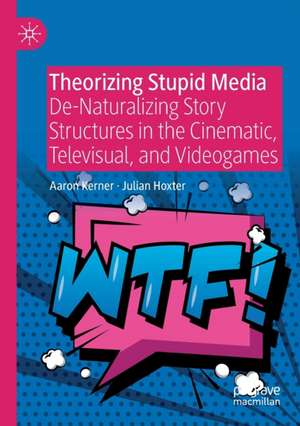Theorizing Stupid Media: De-Naturalizing Story Structures in the Cinematic, Televisual, and Videogames
Autor Aaron Kerner, Julian Hoxteren Limba Engleză Paperback – 14 noi 2020
| Toate formatele și edițiile | Preț | Express |
|---|---|---|
| Paperback (1) | 382.75 lei 6-8 săpt. | |
| Springer International Publishing – 14 noi 2020 | 382.75 lei 6-8 săpt. | |
| Hardback (1) | 503.70 lei 6-8 săpt. | |
| Springer International Publishing – 14 noi 2019 | 503.70 lei 6-8 săpt. |
Preț: 382.75 lei
Nou
Puncte Express: 574
Preț estimativ în valută:
73.24€ • 78.32$ • 61.07£
73.24€ • 78.32$ • 61.07£
Carte tipărită la comandă
Livrare economică 17 aprilie-01 mai
Preluare comenzi: 021 569.72.76
Specificații
ISBN-13: 9783030281786
ISBN-10: 3030281787
Pagini: 227
Ilustrații: XI, 227 p. 10 illus., 9 illus. in color.
Dimensiuni: 148 x 210 mm
Greutate: 0.29 kg
Ediția:1st ed. 2019
Editura: Springer International Publishing
Colecția Palgrave Macmillan
Locul publicării:Cham, Switzerland
ISBN-10: 3030281787
Pagini: 227
Ilustrații: XI, 227 p. 10 illus., 9 illus. in color.
Dimensiuni: 148 x 210 mm
Greutate: 0.29 kg
Ediția:1st ed. 2019
Editura: Springer International Publishing
Colecția Palgrave Macmillan
Locul publicării:Cham, Switzerland
Cuprins
1.The Stupider the Better.- 2.The Stupid in the Contemporary Hollywood Vernacular: Spectacularly Stupid Transformers.- 3.The Stupid in Genre Fails.- 4.The Stupid as Narrative Dissonance.- 5.The Stupid as Ludonarrative Dissonance.- 6.Conclusion: Well That Was Stupid.
Notă biografică
Aaron Michael Kerner is a Professor in the School of Cinema at San Francisco State University, USA. His previous publications include: Extreme Cinema (2016), Torture Porn in the Wake of 9/11 (2015), and Film and the Holocaust (2011).
Julian Hoxter is an Associate Professor in the School of Cinema at San Francisco State University, USA. His previous publications include: Off the Page: Screenwriting in the Era of Media Convergence (2017), Screenwriting (Behind the Silver Screen Series Book 8) (2014). He has published two screenwriting textbooks.
Julian Hoxter is an Associate Professor in the School of Cinema at San Francisco State University, USA. His previous publications include: Off the Page: Screenwriting in the Era of Media Convergence (2017), Screenwriting (Behind the Silver Screen Series Book 8) (2014). He has published two screenwriting textbooks.
Textul de pe ultima copertă
This book explores the stupid as it manifests in media—the cinema, television and streamed content, and videogames. The stupid is theorized as media that “fails” to conform to established narrative conventions, often surfacing at evolutionary moments. Each chapter explores different manifestations of the stupid: exemplified in the Transformers franchise the contemporary Hollywood vernacular privileges kinetic qualities over conventional narration, and is often dismissed as being stupid. The stupid is also evident in genre failures. Narrative dissonance, where a story “feels off”, might be perceived as stupid—Adventure Time being a key example. “Ludonarrative dissonance” refers to instances in videogames (e.g., Bioshock) where gameplay seemingly runs counter to the narrative, thus stupefying. The authors take the film Sucker Punch as a concluding exercise, applying the book’s theorization of the stupid. This book is addressed to those interested in media that is quirky, spectacle-driven, or generally hard to place—stupid!
Caracteristici
Creates a critical space where media objects that might be assessed, without relying on a narrative-based critical paradigm Covers material that is effectively “persona non grata” in the field of media studies, notably the Transformers franchise Moves freely move across a range of media, and media convergences (e.g., cinema, television and streaming, as well as videogames) putting for instance the animated series Adventure Time in conversation with the videogame Gone Home
